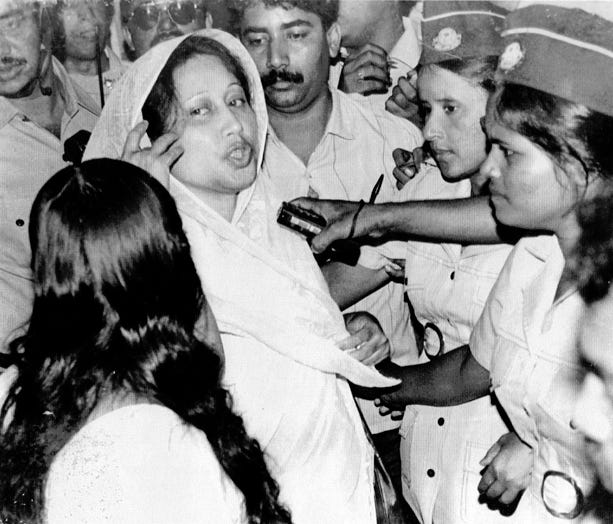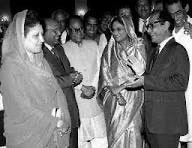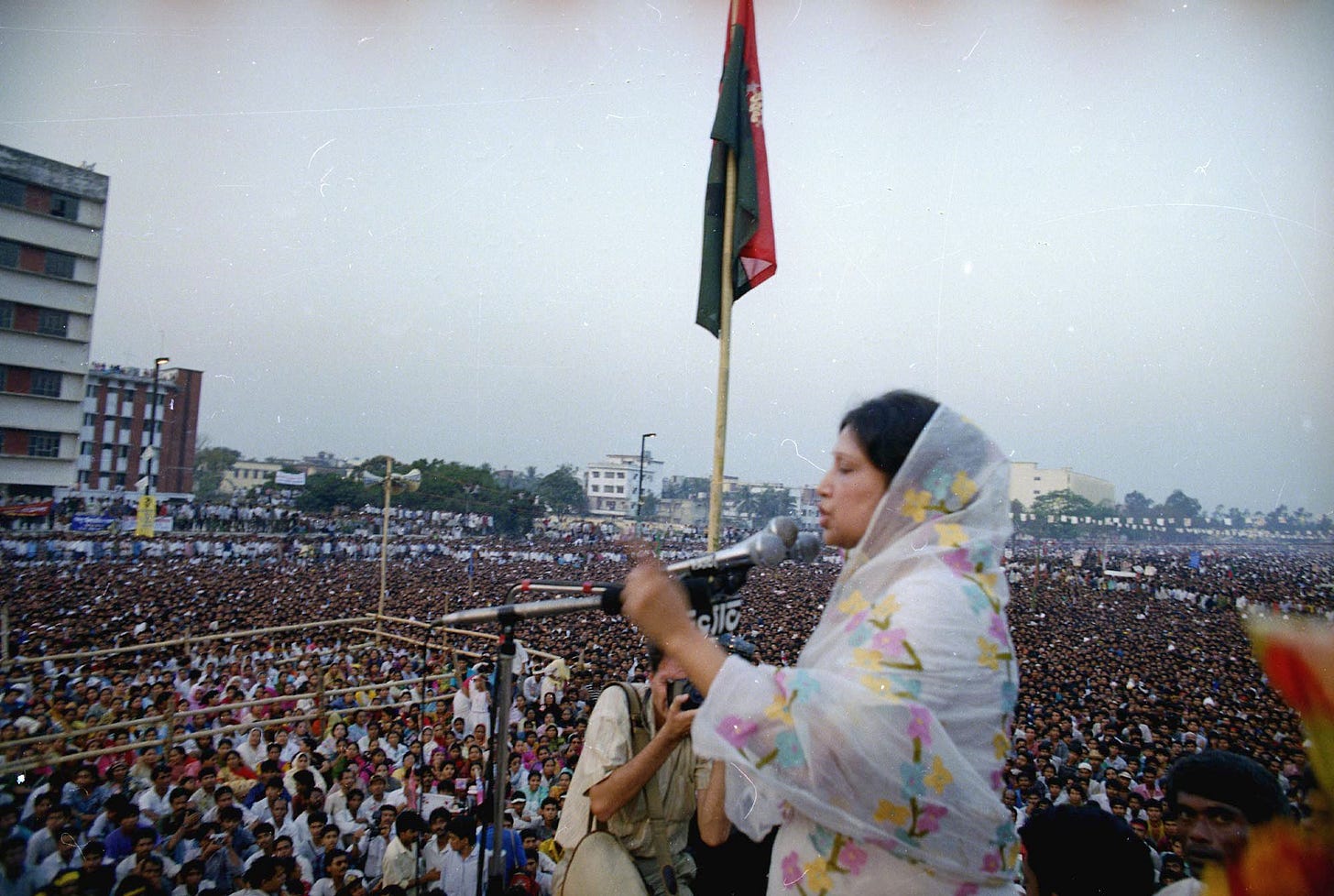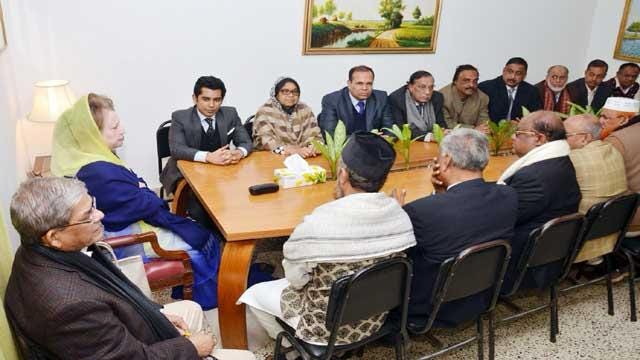Held high is the head
A duality of unyielding principles and political pragmatism that defines Khaleda Zia’s enduring influence
Synonyms for the word “uncompromising” include determined, resolute, and steadfast. Inflexible, intransigent, obstinate, rigid —these are also synonymous with uncompromising. The former set of words usually mean something positive about the person they are applied to. The latter set, on the other hand, generally has a negative connotation.
The adjective that is most associated with Khaleda Zia is “uncompromising.” The adjective, of course, is used in a political context, and usually positively by her supporters — for example, as the “uncompromising leader” (aposhheen netri in Bangla). This is appropriate. Khaleda Zia has been uncompromising — determined, resolute, steadfast — in her commitment to a democratic Bangladesh. However, it is seldom appreciated how much she has compromised — being politically flexible and agile, eschewing intransigence and obstinacy — over her four decades long political career because of her very commitment to a democratic Bangladesh.
Let us start with the genesis of the epithet “uncompromising”.
Bangladesh was under martial law in the early 1980s, and HM Ershad headed a military junta. The opposition parties at that time coalesced in two alliances — one was led by Awami League, the other was centred around the BNP. Of course, the two alliances differed over their vision for a post-Ershad Bangladesh. But they agreed that any election held by the military regime should be boycotted, as any such election would be rigged to give the junta a fig leaf of legitimacy.
There was much distrust between the two alliances, and the general sought to exploit this. He managed to convince the Awami League leader to join the parliamentary election in May 1986, despite her statement a few weeks earlier that only “national traitors” (jatiyo be-imaan) would do so. The expectation was that with the League on the hustings, BNP could not possibly stay away. In the event, Khaleda Zia was resolute in her commitment, BNP did stay away, Ershad did rig the election, and the sham parliament did confer constitutional legitimacy on his 1982 power grab.
Khaleda Zia was dubbed uncompromising — aposhheen — for honouring her words, even though it seemingly weakened her politically.
Fast forward two decades and history seemed to rhyme —to use Mark Twain’s word — in a remarkable manner. The generals behind the January 2007 coup were not as blunt as Ershad in their power grab, hiding behind a bunch of technocrats. Behind the scene, however, leaders of the two largest parties were offered a safe exit overseas in return for their retirement from politics. The gambit —popularly called minus-2 — was to have eased the way for the generals to hold their election and formally assume power. Their ploy was foiled because Khaleda Zia refused to go into exile, accepting imprisonment for herself, and torture of her sons, other family members, and untold number of party members. In the process, her personal life was destroyed, and BNP was severely weakened as a party. But Bangladesh was spared a prolonged military rule.
On both occasions, her uncompromising stance was not about personal or even partisan political gains. She was uncompromising in her commitment to a democratic Bangladesh, even if that commitment meant personal suffering and political setbacks.
And that very commitment to a democratic Bangladesh also meant she did compromise on many other occasions. The BNP supported a presidential form of government. The party won a parliamentary majority in the 1991 election. Winning five seats in landslide margins across the country, Khaleda Zia was easily the most popular politician in the country — by way of contrast, the Awami League chief lost by large margins to relatively unknown candidates in two seats in Dhaka. Mrs Zia could have pressed ahead with a presidential election that she would have been odds on favourite to win. But sensing that there was a groundswell of sentiment towards restoring the parliamentary system, she compromised and worked with the League and others to amend the constitution.
Of course, Khaleda Zia’s goodwill was not reciprocated by the then opposition leader, who chose intransigence and obstinacy in her quest to deny her “a moment of peace” (ek muhurto shanti te thakte debo na). The opposition resigned from parliament in late 1994 and boycotted the February 1996 election. Khaleda Zia won a one-sided contest. But unlike what would be done in 2014, she knew that whatever the technicalities, a democratic Bangladesh required another constitutional amendment and an election that was participated by both major parties. Instead of clinging on to power through brute force, Mrs Zia compromised over the caretaker system in 1996.
She would compromise yet again in 2008, despite personal and political setbacks, for her commitment to a democratic Bangladesh. After their minus-2 misadventure flopped in 2008, the generals needed a widely participated election so that they could return to the barracks. By that time, however, the BNP was severely weakened organizationally with several key leaders —including Tarique Rahman, the Senior Joint Secretary (and Khaleda Zia’s eldest son) —tortured, jailed, or exiled. The playing field in 2008 was decidedly uneven. And yet, she compromised and participated in the December 2008 election —an election she knew BNP was in no position to win as the deck was stacked against it — because it would usher in a restoration of democratic politics.
Khaleda Zia’s commitment to democracy has also manifested itself in how she has led party over four decades, in opposition and in government, and how she governed as the Prime Minister on two separate occasions. Let’s consider these in turn.
Its detractors often describe the BNP as a ‘King’s Party’. Created by intelligence agencies to provide a vehicle for a military ruler to give his regime a civilian, constitutional veneer, various “official” Muslim Leagues under Ayub Khan, Zia-ul-Huq and Pervaiz Musharraf in Pakistan, or the Jatiya Party in Bangladesh, are King’s parties in our part of the world. Such parties cease to be a national political force with the end of the respective general’s stint in power —though, of course, pockets of local support for individuals can persist over decades.
The BNP, of course, does not fit this pattern at all. The party remained a major opposition force throughout the 1980s, won two widely-participated elections (1991 and 2001), was the largest credible opposition against the despot who fled on 5 August, and is now the country’s largest political party. Of course, Khaleda Zia is the key factor behind BNP’s success. She has won in every seat she has contested from across the country in multiple elections. She is undoubtedly the most popular politician Bangladesh has seen in the last four decades.
But it would be too simplistic to say that BNP’s success is because of her personal popularity or charisma. Rather, it is her leadership — a consultative, collective, democratic decision-making inside the party — that underpins BNP’s success.
At its inception, the BNP was composed of veteran politicians of the left as well as the right, along with accomplished young men and women who were inspired by Ziaur Rahman to join politics to build the war-ravaged, famine-stricken country. Some of these people had proved to be charlatans and political opportunists, joining the Ershad regime by the time she had assumed the party leadership. Others made political miscalculations over the years, leaving the party at different junctures. As the party Chairperson, Khaleda Zia had worked assiduously with various factions and cliques with the party, listening to various perspectives and making decisions through consultation and consensus as much as was possible. Various leaders and activists were to return to the party over the years reflecting the grassroots’ wishes —wishes that Khaleda Zia always honoured.
Under her, BNP has not been a party where the leader dictates the decision. And the governments of Prime Minister Khaleda Zia were not the ones where all power rested solely in her persona. From Hitler to Hasina, a curious thing about autocrats is that the leader is credited with everything that goes well, but nothing that goes wrong is the leader’s fault. Democratic leaders, in contrast, tend to delegate responsibilities, but take it upon their shoulders when needed. And Khaleda Zia was a democratic prime minister.
Most observers of Bangladesh’s economic development would credit the economic reforms of the early 1990s for laying the foundation for the three decades-long boom that is now under threat from scandalous mismanagement. Many would also credit various policies adopted in the early 1990s to improve female literacy. In the early 2000s, the government moved to abolish plastic bags and two-stroke engines in groundbreaking environmental measures. One can go on to make a much longer list of policy successes by the two governments that Khaleda Zia led as the prime minister.
Instead of such list-making, let’s stress the democratic leadership of Khaleda Zia — that she chose a cabinet of competent people, allowed them the autonomy to propose and prosecute their policies, taking decisions after collective consultation, with consensus as much as possible, and then allowing the ministers to implement the policies in their respective portfolios. This is how democratic governance is supposed to be. In the Westminster tradition, the Prime Minister is primus inter pares, first among equals of the ministers. That is exactly what Prime Minister Khaleda Zia tried to be. Hers has never been to ask “who gave you this that and other” (ke diyeche ey shob) and threaten to shut everything (shob bondho kore dibo).
And yet, a democratic leader takes responsibility for the failures of their party or government. Of course, one can make a long list of mistakes that were made by the two governments of Prime Minister Khaleda Zia. The relevant point for us, however, is that she was a democratically elected Prime Minister who has never shied away from facing the public judgment on her record —warts and all. The proverbial buck always stopped with her, and there was never excuses of “she was misled” (onake bhul bujhano hoyechhe).
Over a century ago, Rabindranath Tagore prayed in his Nobel-winning volume that the county awakes to a state where the mind is free of fear and the head is held high (chitto jetha bhoyshunno, uccho jetha sheer). Bangladesh under the fallen despot was manifestly not such a land. But it was heading that way under Khaleda Zia — that’s why the courts could rule against the government then, and cartoonists could freely lampoon the Prime Minister, her family, and her government.
This stuff is unthinkable under the despot who fled Ganabhabanon on August 5.
All that said, we also need to reckon with the fact that democracy failed to take root in spite of Khaleda Zia’s two stints in power.
Democratic transition to a “heaven of freedom” (in Tagore’s words) require partnership among political actors. Nelson Mandela needed the active co-operation of FW De Klerk to end the Apartheid regime democratically in South Africa. Dr Martin Luther King Jr and Lyndon B Johnson worked together to give civil rights to African Americans in the 1960s. Mohammed Ali Jinnah, Jawaharlal Nehru and Lord Mountbatten worked together to end the Raj and avoid further bloodshed in 1947. Democratic transitions are never works of a sole leader.
Such partnerships, however, were missing in Bangladesh. Instead, the open arms of compromise that Khaleda Zia had extended had repeatedly been met by a clenched fist from the other side. That is why upon losing the free and fair election of 1991, the Awami League chief made a ridiculous claim of “acute rigging” (shukkho karchupi). That is why the then opposition called around 180 days of hartal against a democratic government. Imagine a Bangladesh where the democratic process was not poisoned thus!
Of course, history hasn’t played out that way, and the struggle for a democratic Bangladesh remains incomplete. Khaleda Zia remains a living icon of that struggle. Hers is, in the words of Kazi Nazrul Islam, “the head ever held high” (cheero unnoto sheer).
First published in the Dhaka Tribune.




